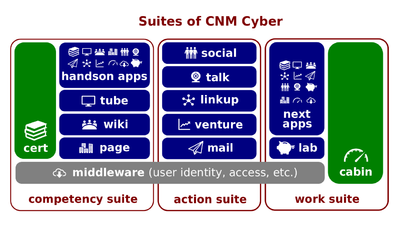Applicant Selections
The Applicant Selections (hereinafter, the Lesson) is the lesson of CNMCyber that introduces its participants to the terms and procedures regarding evaluation of job candidates by the employers The Lesson belongs to the Introduction to Recruitment session of EmployableU Concepts.
The Lesson is made up of four lectios. At CNMCyber, the word, lectio, is used for a lesson part.
Contents
Summaries
Predecessor
- The predecessor lesson is Sought Competences.
Outline
Successor
- The successor lesson is Recruiters' Essentials.
2019 Candidate Screening
The video of the presentation is published on https://youtu.be/BSAlYAu-aWo (5:02). Its full text is below.
Overview
- Welcome to Screening of Job Candidates. In this brief presentation, we are going to take a look at how recruiters evaluate job candidates for whether they can do the job. Special stops will be made by some popular tools. Let's kickoff.
What candidate screening is
- Assuming we have got potential candidates, the next step is to screen them. Screening is the evaluation or investigation of a source as a part of methodical survey to assess suitability of a particular role or purpose.
Tools and techniques
- Technically for our occupation in our industry. There are many different techniques and tools that can be used for source screening. One of the most popular is job interview but here it is very rear for a candidate to get a job immediately, of course when the applicants submit their credentials it makes sense to take a look at them, you can check for mistakes, and certifications claimed by the applicant in the databases, or trade certificates if this person is listed on the website, but eventually job interview is like somewhere 99.5% job candidates will have some kind of a job interview. Normally what we say job interview should be called employment interview because job interview can be for a particular job or for a particular employment or it could be about like general jobs in the company.
Employment interview
- Employment interview is the interview that consist of a conversation between a job applicant and one or more representatives of the employer which is conducted to, a, assess whether the applicant may be hired, and, bee, negotiate conditions of this hiring.
- Job interviews consist of general questions like, tell me about yourself. Some job interviews are more technical, for instance, are you familiar with convers tech? What do you know about this? What do you like about this? When do you prefer to use that? Some job interviews can be more technical interviews rather than the job interview.
Situational judgment tests
- Job interview is not the only way to assess the person, situational job judgment test is a substantive selection test that ask applicants how they will perform in a variety of situation. And their answers are then compared to the answers of high performing employees. Some situational job judgement tests can be included in the job interview as well instead of given like separate test. Most of the small companies searching for employees will probably do that. Bigger employers tend to have a more developed process, smaller employers may have like a very easier, less complicated recruitment or screening process.
Work sample tests
- Another tool can be a work sample test, here basically a job candidate is offered to perform as they will perform on the work, it could be assessment center, an offside place where candidates are given performance situation tests designed to evaluate their managerial potential. Why managerial? This is because assessment centers are expensive.
Summary
- This concludes the Screening of Job Candidates presentation. We have defined source screening and taken a look at popular tools that recruiters and hiring managers use to screen employment candidates such as job interviews, situational judgment tests, work sample tests, and services of special assessment centers. If you haven't done yet so, you are now welcome to move to Recruiters' Essentials.
